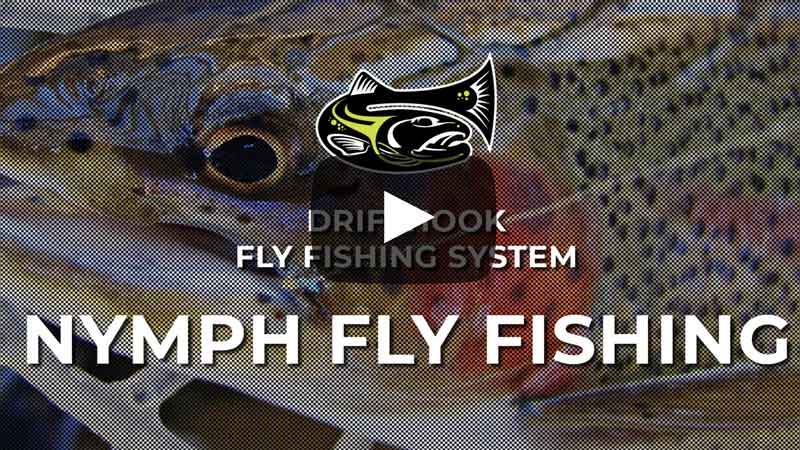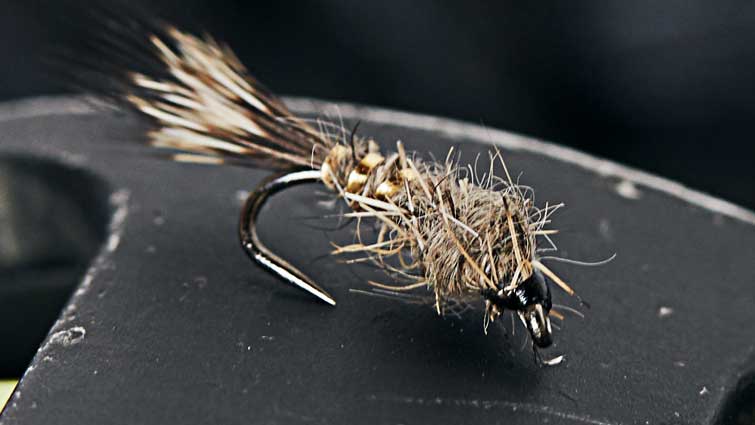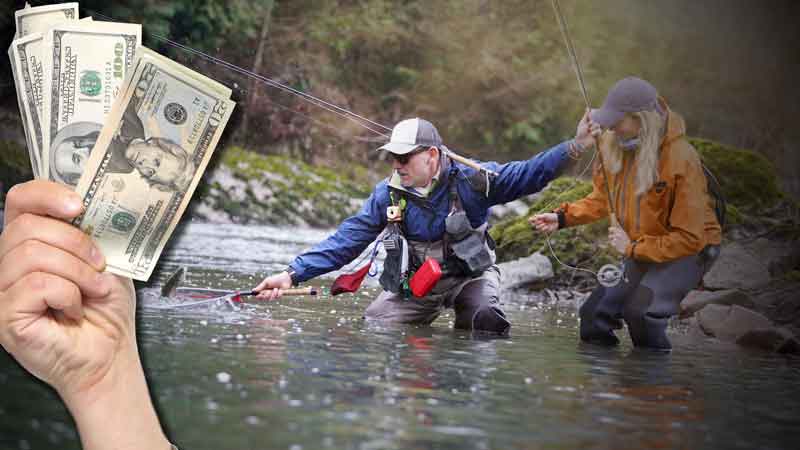The Prince Nymph itself has a rich history, originating in the 1930s and becoming a staple due to its proven effectiveness. The Psycho Prince Nymph, created by fly tying innovator Mike Mercer, builds on this legacy by adding a contemporary twist that enhances its visibility and appeal underwater. This adaptation has made it a favorite among fly fishing enthusiasts who seek to improve their catch rates.
This comprehensive guide will delve into the intricate process of tying the Psycho Prince Nymph, ensuring you have all the necessary materials and steps to create this alluring fly. We will also explore the Prince Nymph variations that can be adapted to different fishing scenarios. Additionally, you’ll learn effective techniques for fishing the Psycho Prince Nymph, drawing from expert advice to maximize your success on the water.

What is the Psycho Prince Nymph?
The Psycho Prince Nymph is a type of artificial fly used in fly fishing, specifically designed to imitate the underwater nymph stage of aquatic insects that trout and other fish feed on. This fly is an evolution of the classic Prince Nymph, a fly that has been a staple in the fly fishing community for decades due to its effectiveness.
The Psycho Prince Nymph is a striking, vibrant fly combining colorful and flashy materials. Here’s a breakdown of its key components:
- Body: The body is typically made from peacock herl, which provides a natural iridescence that mimics the body of real nymphs.
- Tail: Brown goose biots are used for the tail, giving it a lifelike split-tail appearance.
- Wing: White goose biots form the wing, adding visibility and mimicking the natural wing buds of a developing nymph.
- Ribbing: Gold wire is used to rib the body, adding durability and a bit of flash.
- Collar: The collar is often made from Ice Dub, a synthetic material that adds a glittery, attention-grabbing aspect to the fly.
- Head: A gold bead head adds weight, helping the fly to sink quickly and get to the feeding zone of the fish.
How It Differs from Other Nymphs
Unlike more subdued nymph patterns, the Psycho Prince Nymph is designed to stand out in the water. Here are some aspects that make it unique:
- Flash and Color: The use of bright, flashy materials like Ice Dub and gold wire makes the Psycho Prince Nymph highly visible in the water, even in murky conditions. This can be especially effective in attracting fish that are drawn to bright colors and movement.
- Weight: The gold bead head not only adds to the fly’s attractiveness but also ensures it sinks quickly. This is crucial for getting the fly to the right depth where fish are feeding.
- Versatility: The Psycho Prince Nymph can be used in various fishing conditions, from fast-moving rivers to still waters. Its construction allows it to mimic a wide range of aquatic insects, making it a versatile choice in your fly box.

Comparison to the Classic Prince Nymph
The classic Prince Nymph, while effective, is more subdued in its appearance. It typically features a brown or black body with minimal flash. The Psycho Prince Nymph uses this reliable design and amps it with vibrant colors and materials. This makes it particularly effective in situations where extra visibility and attraction are needed, such as in stained or deep waters.
In summary, the Psycho Prince Nymph is a dynamic and versatile fly that combines the proven effectiveness of the classic Prince Nymph with modern, eye-catching materials. Whether you're targeting trout in a clear mountain stream or a murky river, this fly can significantly enhance your chances of success.
History of the psycho prince nymph
The Psycho Prince Nymph is a modern adaptation of the classic Prince Nymph, a fly that has been a staple in fly fishing for decades. The original Prince Nymph was developed in the 1930s by Doug Prince and has since become a go-to fly for anglers targeting trout in various water conditions. The Psycho Prince Nymph, created by Mike Mercer, incorporates flashy materials and vibrant colors to enhance its visibility and attractiveness to fish. This modern twist on a classic design has made it a favorite among fly fishers looking to up their game.

Materials needed for psycho prince nymph
To tie the Psycho Prince Nymph, you'll need the following materials:
- Hook: Tiemco 5262 or equivalent (sizes 12-16)
- Thread: Red 8/0 or 70 denier
- Tail: Brown goose biots
- Ribbing: Gold wire (brassie or medium size)
- Body: Peacock herl
- Wing: White goose biots
- Collar: Ice Dub (pearl or UV pearl)
- Head: Gold bead (3/32" - 7/64")
Having the right materials on hand is crucial for creating a fly that looks good and performs well in the water.
How to tie the psycho prince nymph
Based on the tutorial video by Tightline Video, here is a step-by-step guide to tying the Psycho Prince Nymph. You can watch the full video here:
- Start the Thread: Secure your hook in the vise and start the red thread behind the hook eye. Wrap back to the bend of the hook.
- Attach the Tail: Take two brown goose biots and tie them in at the bend of the hook, ensuring they splay outwards.
- Add the Ribbing: Tie in a piece of gold wire at the base of the tail and let it hang.
- Build the Body: Tie in several strands of peacock herl and wrap them forward to create a thick, tapered body. Secure with thread.
- Wrap the Ribbing: Counter-wrap the gold wire over the peacock herl body, securing it with thread at the front.
- Attach the Wing: Tie in two white goose biots on top of the hook, ensuring they angle slightly upward and outward.
- Add the Collar: Dub a small amount of Ice Dub around the thread and wrap it behind the hook eye to create a collar.
- Finish the Head: Slide a gold bead to the front and secure it with several wraps of thread. Whip finish and cut the thread.
This step-by-step process should help you create a beautifully tied Psycho Prince Nymph that is sure to attract fish.
Prince Nymph variations
There are several variations of the Prince Nymph that you might find useful, each with its own unique features:
Standard Prince Nymph:
The original design with peacock herl body, brown biot tail, and white biot wings. It's a classic for a reason.

Beadhead Prince Nymph:
Incorporates a gold or silver bead at the head for added weight and sparkle.

Psycho Prince Nymph:
Our focus fly, with vibrant colors and flashy materials for increased effectiveness.

Experimenting with these variations can help you determine which works best in different fishing conditions.
How to fish a psycho prince nymph
Fishing a Psycho Prince Nymph effectively requires understanding basic nymphing techniques. Here are some tips from Drifthook's article on nymphing:
- Rigging: Use a nymphing rig with an indicator or a dry dropper setup. Ensure your leader is at the right length to reach the fish's feeding zone.
- Depth Control: Adjust the depth of your nymph to keep it close to the riverbed where trout are feeding.
- Drift: Achieve a natural drift by casting upstream and letting the fly float down with the current. Avoid drag by mending your line.
- Strike Detection: Watch your indicator closely for any subtle movements that indicate a strike. Set the hook quickly but gently.
- Presentation: Vary your presentations by changing the speed and depth of your nymph. Sometimes, a slight twitch can entice a strike.
These techniques will help you maximize your success when fishing with a Psycho Prince Nymph.
Conclusion
The Psycho Prince Nymph is a versatile and effective fly that should be part of every fly fisher's arsenal. Understanding its history, knowing how to tie it properly, exploring its variations, and mastering the techniques to fish it will undoubtedly enhance your fly fishing experience. With the right approach and a bit of practice, you'll find the Psycho Prince Nymph to be a reliable and productive choice on the water.






